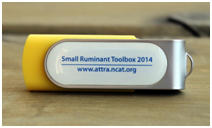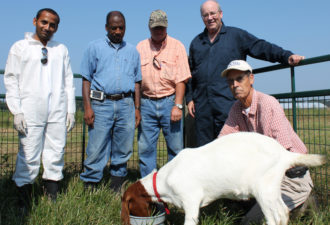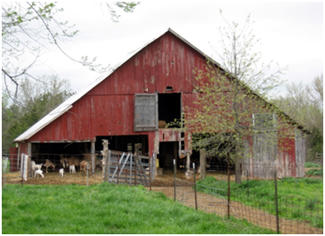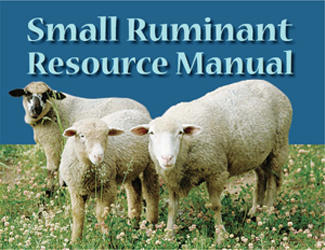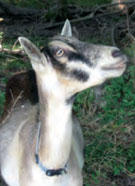Sheep and goat enterprises offer diversification opportunities for small and limited-resource farmers. This Small Ruminant Toolbox was developed by the National Center for Appropriate Technology (NCAT) in order to provide a collection of information for small ruminant producers and educators. The Small Ruminant Toolbox includes many publications, presentations and other resources that will be helpful to small ruminant producers.
Get the Small Ruminant Toolbox to go!
All Toolbox materials are available on a USB flash drive for sale through NCAT. Contact debbier@ncat.org or call 1 (800) 346-9140 for current pricing.
Contents and Instructions
- Overall Table of Contents [PDF]
- How to Use the Toolbox
- Especially for Agents
- PowerPoint Library
- Small Ruminant Resource Manual
- Sheep and Goat FAQ
- Additional Resources
How to Use the Toolbox |
| Toolbox materials can be used for presentations, trainings and self-study by both producers and educators. Presentations can be used in their entirety or can be modified to fit the presenter's experience or topic, with the following exception: Please do not modify slides from the Tennessee Master Meat Goat Producer Program.The "Building a Workshop" presentation is not specific to sheep and goat production. It can give reminders to anyone planning to host a workshop on any subject, and can be used to trigger discussion during in-service trainings for agents as well.ATTRA materials that are part of this Toolbox can be downloaded from this page. Hard copies are available by calling 1 (800) 346-9140, by accessing the livestock section of the ATTRA website.
Many topics are not covered in this Toolbox. Some topics are covered in multiple presentations. Use what is useful to you, and please give feedback to the project leader, Linda Coffey, at lindac@ncat.org. |
| Especially for Agents |
|
PowerPoint Presentations
ATTRA Publications
|
Small Ruminant Resource Manual |
|
At 978 pages, the Small Ruminant Resource Manual is a very large PDF. It's best to open and view the Manual with Adobe Reader, version 6 or later. Each chapter opens with a list of contents and closes with a list of additional resources. Page numbers of the PDF are provided beside each title in the table of contents to assist you in finding and printing a particular article. ATTRA publications are also available by calling 1 (800) 346-9140 or online at www.attra.ncat.org. |
Additional Resources |
|
Additional educational resources include: SARE
ATTRA Other Resources
|
lindac@ncat.org and margoh@ncat.org
Susan Schoenian, Maryland Cooperative Extension Service
This Toolbox was developed with funding from a Southern SARE Professional Development Program grant, with further funding support from SARE Outreach.
Want more information? See the related SARE grant:
This material is based upon work that is supported by the National Institute of Food and Agriculture, U.S. Department of Agriculture through the Sustainable Agriculture Research and Education (SARE) program. Any opinions, findings, conclusions, or recommendations expressed in this publication are those of the author(s) and should not be construed to represent any official USDA or U.S. Government determination or policy.
